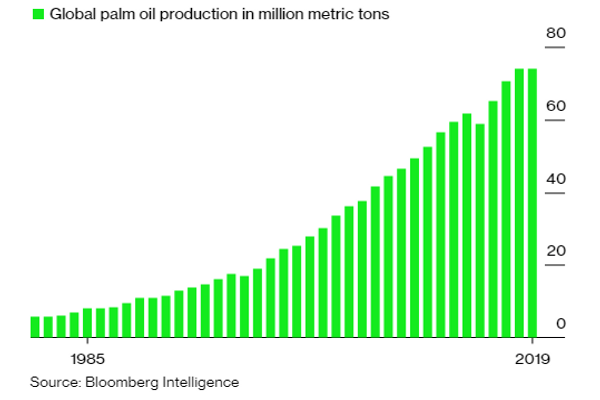
Date: 2024-12-21 Page is: DBtxt003.php txt00018394
Technical Innovation
Synthetic Palm Oil
Bill Gates-Led Fund Invests in Synthetic Palm Oil Startup ... C16 Biosciences uses yeast to convert food waste and industrial byproducts into a sustainable alternative.
Peter Burgess
Breakthrough Energy Ventures, helmed by Bill Gates, is leading an investment round of $20 million for C16 Biosciences, a New York-based startup, which is working on making sustainable alternatives for palm oil.
The three-year-old startup uses microbes to convert food waste and industrial byproducts into synthetic palm oil, which it claims can replace the plant-derived version. The investment will be used to grow the team and scale up the technology. It’s one of a growing number of startups working on developing alternatives.
Interest in alternatives to palm oil is growing as curbing its environmental impact becomes more critical. Most palm oil is produced in the tropics, where companies often destroy carbon-rich forests to make space for plantations. What’s even worse is that many producers light fires as a cheap way to clear forests and agricultural land, which adds to the greenhouse-gas emissions from the process and wrecks the region’s rich biodiversity.
Hooked On
Palm oil's use in everyday products has shot up in recent decades.

Source: Bloomberg Intelligence
The palm oil market is expanding rapidly and could be worth almost $93 billion next year. Starting in the mid-1990s, following research showing vegetable oils are bad for health, big food brands switched over to using palm oil, which does not contain harmful trans fats. Now it’s found in more than 50% of consumer products, according to non-profit Palm Oil Investigations.
Breakthrough Energy Ventures wants to invest in companies that have the potential to cut emissions by as much as 500 million metric tons each year. The fund's investors include Amazon.com Inc. founder Jeff Bezos, Virgin Group boss Richard Branson and Michael Bloomberg, the founder and majority owner of Bloomberg LP.
Sustainable Alternatives
Sustainable palm oil is available in the market today, but its production is small and it isn’t cheap. That’s why startups, such as C16, are trying something different.
C16 uses a proprietary yeast which it feeds with carbon-containing waste. This could include excess food from supermarkets and homes or glycerol from biofuels production. The startup can make about 10 kg of its synthetic palm oil each week, which it plans to ramp up to 1,000 kilograms using the money invested. This would allow it to supply large businesses, starting with cosmetics companies and then the food industry.
The use of waste ensures raw materials are cheap and lowers the environmental impact, said Shara Ticku, C16's chief executive. It gives the synthetic alternative a chance to be priced as low, if not cheaper than, the natural version.
Other companies are following suit. California-based startup Kiverdi Inc. is using microbes to convert carbon dioxide into an alternative to palm oil. Scottish startup Revive Eco is extracting useful oils from coffee waste and Indonesian startup Biteback is finding those oils in insects.
There’s no guarantee that it will work. The University of Bath is studying the development of palm oil alternatives and it’s expected to conclude that current technology isn't economic on a commercial scale. The highest expense is extracting the palm oil once the microbes have made the synthetic version, said David Leak, a professor in the university's biology and biochemistry department. Without overcoming those hurdles, palm oil alternatives might remain a niche product.
-------------------------------------------------
More From Bloomberg Green
U.K. Energy Prices are Plunging, But Users are Facing Rate Hikes
Europe Mounts Pitched Battle Against Tesla for Electric Car Lead
Trump’s Best Shot at Saving Coal Is an Obscure Power Market Rule
The Virus-Hit Global Economy Needs a Green Stimulus